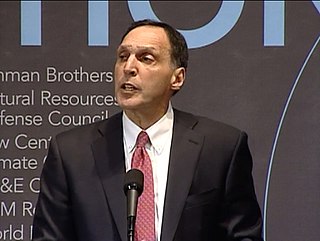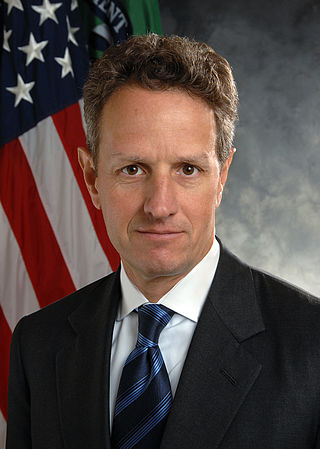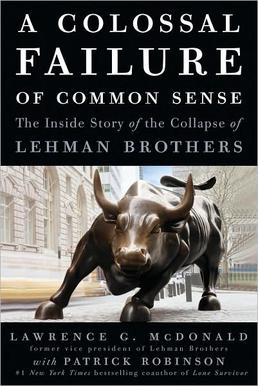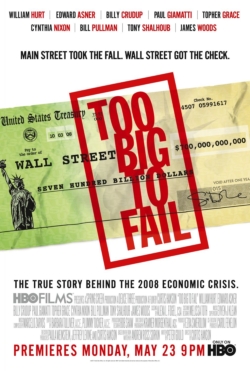
Lehman Brothers Inc. was an American global financial services firm founded in 1847. Before filing for bankruptcy in 2008, Lehman was the fourth-largest investment bank in the United States, with about 25,000 employees worldwide. It was doing business in investment banking, equity, fixed-income and derivatives sales and trading, research, investment management, private equity, and private banking. Lehman was operational for 158 years from its founding in 1850 until 2008.

The Bear Stearns Companies, Inc. was an American investment bank, securities trading, and brokerage firm that failed in 2008 as part of the global financial crisis and recession. After its closure it was subsequently sold to JPMorgan Chase. The company's main business areas before its failure were capital markets, investment banking, wealth management, and global clearing services, and it was heavily involved in the subprime mortgage crisis.

Richard Severin Fuld Jr. is an American banker best known as the final chairman and chief executive officer of investment bank Lehman Brothers. Fuld held this position from the firm's 1994 spinoff from American Express until 2008. Lehman Brothers filed for bankruptcy protection under Chapter 11 on September 15, 2008, and subsequently announced the sale of major operations to parties including Barclays Bank and Nomura Securities.

Merrill Lynch & Co., formally Merrill Lynch, Pierce, Fenner & Smith Incorporated, was a publicly-traded American investment bank that existed independently from 1914 until January 2009 before being acquired by Bank of America and rolled into BofA Securities.
Earnest Stanley O'Neal is an American business executive who was formerly chairman and chief executive of Merrill Lynch having served in numerous senior management positions at the company prior to this appointment. O'Neal was criticized for his performance during his tenure as chief executive at Merrill Lynch, where he oversaw the deterioration of the firm's stability and capital position, which resulted in his ouster in September 2007, and the firm's eventual fire sale to Bank of America one year later. Prior to his tenure as chairman and CEO, Merrill Lynch had thrived as a stand-alone company since 1914.

An asset-backed securities index is a curated list of asset-backed security exposures that is used for performance bench-marking or trading.
The subprime mortgage crisis impact timeline lists dates relevant to the creation of a United States housing bubble and the 2005 housing bubble burst and the subprime mortgage crisis which developed during 2007 and 2008. It includes United States enactment of government laws and regulations, as well as public and private actions which affected the housing industry and related banking and investment activity. It also notes details of important incidents in the United States, such as bankruptcies and takeovers, and information and statistics about relevant trends. For more information on reverberations of this crisis throughout the global financial system see Financial crisis of 2007–2008.
This article provides background information regarding the subprime mortgage crisis. It discusses subprime lending, foreclosures, risk types, and mechanisms through which various entities involved were affected by the crisis.

The bankruptcy of Lehman Brothers on September 15, 2008, was the climax of the subprime mortgage crisis. After the financial services firm was notified of a pending credit downgrade due to its heavy position in subprime mortgages, the Federal Reserve summoned several banks to negotiate financing for its reorganization. These discussions failed, and Lehman filed a Chapter 11 petition that remains the largest bankruptcy filing in U.S. history, involving more than US$600 billion in assets.
The Emergency Economic Stabilization Act of 2008, often called the "bank bailout of 2008" or the "Wall Street bailout", was proposed by Treasury Secretary Henry Paulson, passed by the 110th United States Congress, and signed into law by President George W. Bush. It became law as part of Public Law 110-343 on October 3, 2008, in the midst of the financial crisis of 2007–2008. It created the $700 billion Troubled Asset Relief Program (TARP) to purchase toxic assets from banks. The funds were mostly redirected to inject capital into banks and other financial institutions while the Treasury continued to examine the usefulness of targeted asset purchases.
The government interventions during the subprime mortgage crisis were a response to the 2007–2009 subprime mortgage crisis and resulted in a variety of government bailouts that were implemented to stabilize the financial system during late 2007 and early 2008.

Timothy Franz Geithner is an American former central banker who served as the 75th United States Secretary of the Treasury under President Barack Obama from 2009 to 2013. He was the President of the Federal Reserve Bank of New York from 2003 to 2009, following service in the Clinton administration. Since March 2014, he has served as president and managing director of Warburg Pincus, a private equity firm headquartered in New York City.

A Colossal Failure of Common Sense: The Inside Story of the Collapse of Lehman Brothers is a 2009 non-fiction book written by Lawrence G. McDonald and Patrick Robinson which chronicles the events surrounding the bankruptcy of Lehman Brothers in the context of the financial crisis of 2007–2010 and the subprime mortgage crisis. The work is divided into a prologue, an epilogue, and twelve chapters.

Paulson & Co. Inc. is a family office based in New York City, previuosly it was an hedge fund established by John Paulson in 1994. It specializing in "global merger, event arbitrage and credit strategies", the firm had a relatively low profile on Wall Street until its hugely successful bet against the subprime mortgage market in 2007. At one time the company had offices in London and Dublin.

Inside Job is a 2010 American documentary film, directed by Charles Ferguson, about the late-2000s financial crisis. Ferguson, who began researching in 2008, said the film is about "the systemic corruption of the United States by the financial services industry and the consequences of that systemic corruption", amongst them conflicts of interest of academic research, which led to improved disclosure standards by the American Economic Association. In five parts, the film explores how changes in the policy environment and banking practices helped create the financial crisis.

Too Big to Fail is a 2011 American biographical drama television film directed by Curtis Hanson and written by Peter Gould, based on Andrew Ross Sorkin's 2009 non-fiction book Too Big to Fail. The film aired on HBO on May 23, 2011. It received 11 nominations at the 63rd Primetime Emmy Awards; Paul Giamatti's portrayal of Ben Bernanke earned him the Screen Actors Guild Award for Outstanding Performance by a Male Actor in a Miniseries or Television Movie at the 18th Screen Actors Guild Awards.

The 2007–2008 financial crisis, or Global Financial Crisis (GFC), was a severe worldwide economic crisis that occurred in the early 21st century. It was the most serious financial crisis since the Great Depression (1929). Predatory lending targeting low-income homebuyers, excessive risk-taking by global financial institutions, and the bursting of the United States housing bubble culminated in a "perfect storm".
Merrill, previously branded Merrill Lynch, is an American investment management and wealth management division of Bank of America. Along with BofA Securities, the investment banking arm, both firms engage in prime brokerage and broker-dealer activities. The firm is headquartered in New York City, and once occupied the entire 34 stories of 250 Vesey Street, part of the Brookfield Place complex in Manhattan. Merrill employs over 14,000 financial advisors and manages $2.8 trillion in client assets. The company also operates Merrill Edge, a division for investment and related services, including call center counsultancy.

Alvarez & Marsal Holdings, LLC(A&M) is a global professional services firm notable for its work in turnaround management and performance improvement of a number of large, high-profile businesses both in the US and abroad such as Lehman Brothers, HealthSouth, Tribune Company, Warnaco, Interstate Bakeries, Target, Darden Restaurants and Arthur Andersen.

Goldman Sachs controversies are the controversies surrounding the American multinational investment bank Goldman Sachs. The bank and its activities have generated substantial controversy and legal issues around the world and is the subject of speculation about its involvement in global finance and politics. In a widely publicized story in Rolling Stone, Matt Taibbi characterized Goldman Sachs as a "great vampire squid" sucking money instead of blood, allegedly engineering "every major market manipulation since the Great Depression."













